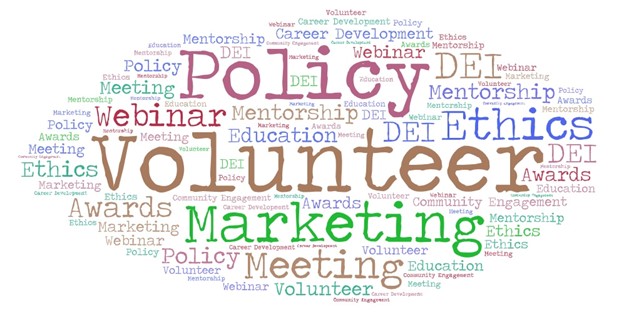Blog post
The Importance of Volunteering, Growing Professionally and Personally, and Making an Impact
11 Jun 2024

First posted on the ORIGINal Thoughts Blog

Consultant, Origin Editorial
President, Editorial Evolution
LinkedIn: https://www.linkedin.com/in/jennifer-mahar/
X: @JenniferLMahar
TikTok: https://www.tiktok.com/@jenmunnis
Volunteer: a person who does something, especially helping other people, willingly and without being forced or paid to do it.
Source: Cambridge Dictionary
Take Home Points:
- Volunteering is important to your professional development and is a way to give back to the community of editorial professionals and scholarly publishing.
- Before volunteering, consider:
- Whether you have the bandwidth to take on a volunteer position; and
- What your volunteering options are.
- Knowing when to step away from volunteering is important to prevent professional and personal burnout.
Service in Publishing
Volunteering speaks to the heart and soul of commitment. If you truly enjoy and support a cause, you are likely to freely give your time and effort. Our work in publishing speaks to us all in different ways. Volunteering takes many forms: many of us want to strengthen our bond within our publishing community, which can be from a teaching perspective, being civic-minded, learning and applying new skills, creating purpose, helping others, helping oneself to further your career or fill an emotional need, and/or bridging the gaps throughout our communities.
Have you ever been asked to join a group, perform a community service, step up to be a leader, or felt a calling to fulfill a personal goal? These volunteer efforts are the cornerstone of any community, and our scholarly publishing family is no exception.
We have many organizations in publishing that rely on the good graces of publishing professionals who volunteer their time to help run the organizations and provide educational content, speak at conferences, write articles, lead committees, and oversee the myriad initiatives that are offered to members and non-members alike. Often, these volunteers work alongside management staff who handle the administrative tasks of the organization. Some members of our community even hold paid positions within these organizations. You should investigate any requirements that might be attached to the volunteer position you are seeking; for example, to be on a committee for the International Society of Managing and Technical Editors (ISMTE) you must be a member of ISMTE, and to be president of most organizations you need to rise through the ranks via a leadership pathway; for example, serving first on the committees, then on the board of directors, then as vice-president, and so on. If you are unclear as to the leadership trajectory of an organiztion you’re interested in, reach out to the current board members and ask them the best path to take to eventually hold a leadership position.
Have you been asked to volunteer, or have you considered volunteering for one of the amazing opportunities offered by the various publishing organizations in our industry? The first thing you need to consider is:
Do I truly have the time to give and am I invested enough in the organization and it’s mission, programs, and initiatives to engage—do I feel connected enough to the organization to make a time committment to it?
How do you decide if you have the time to volunteer? There are many methods you can use to track your time: you can self-record using pen and paper or use spreadsheets on your computer; you can stopwatch yourself using your computer or phone; or you can use a nifty time-tracking app like Harvest or Toggl Track. Whatever method you choose to use, track your time over a week or two to gather a good amount of data for your analysis. Once you’ve tracked your time, you can then determine how you’re spending the hours of your day, establish the importance of all your tasks, and decide if you have the bandwidth to consider volunteering.
Can you streamline some of your duties by using automation? For example, are you moving the same emails into the same folder each day? If so, there are scripts that can be written to help. Can you create a template to reply to that tardy reviewer asking for an extension? Will automation free up enough time to allow you to consider another task? Can you take some tasks off your plate? Any of these methods could provide a half hour over the course of a week that might make it feasible for you to volunteer for a committee that meets once a month and requires you to perform certain tasks. These are all great exercises to help you audit and record your time even if you’re not considering a volunteer position!
Be aware of exactly how much time you think you can devote to the tasks of the committee. Be sure to ask questions about the time the tasks will take per week, month, and year and the length of service involved. For example, if you sign up for Peer Review Week (PRW) you will learn that there are monthly meetings for most of the yearly commitment, but leading up to PRW you will be asked to volunteer for more as the week approaches, so knowing that you have bandwidth during the weeks leading up to mid-September would be important.
In addition to considering the time involved with volunteering for an organization, you need to ensure that doing so aligns with your professional and personal interests. You should have a passion for the volunteer position you commit to. You should be able to greatly benefit from the volunteer position and be able to contribute in a meaningful way, so the reciprocating channel is fulfilled. There are opportunities in every corner of our industry for volunteering—do you have a passion for being a mentor, do you like marketing or social media, or do you enjoy the excitement of leading an organization by serving on the board? Any and all of these paths are possible.
I’ve provided a short list of publishing organizations below—there are many more out there; I encourage you to explore these and branch out into other areas of your personal interest.
- ISMTE: https://www.ismte.org/
- CSE: https://www.councilscienceeditors.org/
- SSP: https://www.sspnet.org/
- COPE: https://publicationethics.org/
- WAME: https://www.wame.org/
- EASE: https://ease.org.uk/
- EQUATOR: https://www.equator-network.org/
- AuthorAid: https://www.authoraid.info/en/
- ALPSP: https://www.alpsp.org/
- ICMJE: https://icmje.org/
- C4DISC: https://c4disc.org/
I have served on the Council of Science Editors (CSE) Editorial Policy Committee for almost 20 years. When I log onto one of our calls or get together with the committee in person at the annual meeting, I feel a deep kinship with this group; some have been with me a long time on this journey, some are new, some are passing through. But each and every time I see their faces I am reminded that I feel comfortable and that I belong—it is the longest connection I have had throughout the course of my 30-year career, and I cherish it deeply.
Carefully consider your options. There is a volunteer position for almost anything – but do it for the right reasons and have passion for the topic. I have built my career on policies and workflows in the editorial office and the Editorial Policy Committee has been a huge part of this success for me. It has given me an edge and kept me abreast of our current issues in publishing, allowing me to become a speaker, moderator, author, and influencer in our craft. And on the flip side, I have the confidence to speak up during our committee calls; I provide insight on relevant topics and offer to lend a hand when I can.
It’s important to know your personal limits by auditing your time, evaluating your tasks, and considering your options. But it’s just as important to know if you are overloaded and have to reduce your workload. The first place to make a change would be a volunteer position. Have you over-extended yourself to the point that you’re not able to attend the calls, accomplish an assigned task or is your heart just not in it anymore? All of these are signs that it might be time to move on. Many volunteer positions have time limits for exactly these reasons, but you have to know your own limits and recognizing when you’ve reached one can be difficult but necessary. When you do say no to a request, consider the reason you are declining and give thought to how you can still provide support. Can you suggest another, more appropriate, volunteer or solution for the request? I recently came across this article that perfectly articulates the art of saying no.
Finally, you don’t have to restrict your volunteer efforts to our industry—many find purpose and meaning by sharing their time to worthy causes in their town, city, state, or country. A 2020 study in the Journal of Happiness Studies reported that volunteering really does make us happier—it can lead to a sense of purpose, provide friendship and mentorship, and lead you to a place you never knew you needed! Volunteer positions can allow you to develop skills for your next job, provide networking opportunities, and can even generate ideas for your next career.
The below word cloud is an example of the places that the Origin consultants volunteer outside of publishing. There’s an amazing world out there; I’m proud to have these individuals as my colleagues.

Origin Editorial is now part of KnowledgeWorks Global Ltd., the industry leader in editorial, production, online hosting, and transformative services for every stage of the content lifecycle. We are your source for society services, market analysis, intelligent automation, digital delivery, and more. Email us at info@kwglobal.com.
Related Posts

From AI Assistance to AI Operations: Takeaways from Eight Trend Reports for Scholarly Publishing

Publishing Predictions: What to Expect from 2026



